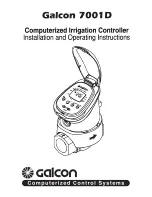
44
Operation and Repair Bulletins
The following documents are sections of our complete service bulletin set available on
our website Spectrawatermakers.com. Technical Support,
-
Service Bulletins.
MB
-
2 MEMBRANE CARE
Membrane life is affected by a large number of factors and is somewhat unpredictable,
however five or six years of use is typical. The biggest killers of membranes are lack
of use, chlorine damage, and improper storage.
Don
’
t let membranes sit around with sea water or stale fresh water in them. Biological
growth will occur in the membrane. Here at the factory we frequently get back mem-
branes for inspection that reek of hydrogen sulfide (rotten eggs). This odor is produce
by anaerobic bacteria that live in an unused membrane, feeding on whatever animal or
vegetable matter is trapped in it from the plankton that gets through the system. Mem-
branes badly fouled in this way can seldom be saved. These bacteria are always pre-
sent but are inhibited by the oxygen in sea water while the unit is in frequent use. If you
won
’
t be frequently using your membrane you can prevent biological growth by Fresh
Water Flushes or by Pickling your membrane. Keeping the prefilters clean is also im-
portant in preventing bio
-
fouling. If your prefilters are allowed to become a breeding
ground for bacteria (get smelly), the contamination will spread throughout the system.
When we cut open a failed membrane we also find mildew, another form of bio fouling,
probably due to long term storage with no biocide or stale biocide.
After many hours of water making mineral deposits will form and must be dissolved
away with an acid cleaner. Alkaline cleaners are used for bio
-
fouling.
Chlorine destroys a membrane in minutes. It attacks the material that the membrane is
made from. Always use product water or water filtered through a charcoal filter for
flushing and chemical treatments.
Oil clogs the membrane. We have brought back oil fouled membranes with dish soap
(See MB
-
5 Cleaning with Detergent.)
For storage we recommend using SC
-
1 or propylene glycol potable water system anti-
freeze if available. Propylene glycol can safely be left in the system for one year and
will keep things from freezing in cold conditions. It is hard to find in warm climates, and
takes up a lot of room on a small boat, so our SC
-
1 is best for tropical cruising.
Even if given good care a membrane will eventually start to slowly fade away. The
feed pressure may rise and/or the ppm go up.
Summary of Contents for LB-1800C
Page 2: ...2 Page Intentionally blank...
Page 4: ...4 Page Intentionally blank...
Page 33: ...33 Black Parker tube fittings...
Page 34: ...34 John Guest Super Speedfit Fittings...
Page 48: ...48...
Page 49: ...49...
Page 50: ...50...
Page 51: ...51...
Page 52: ...52...










































